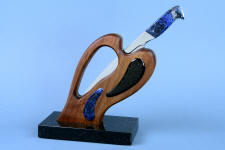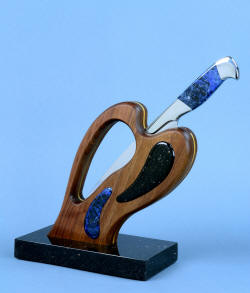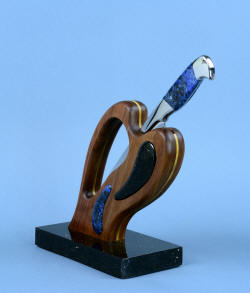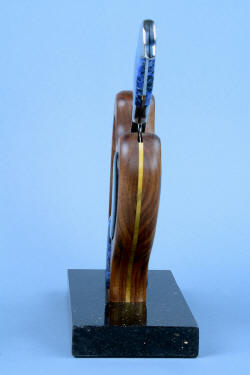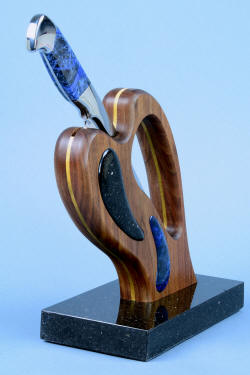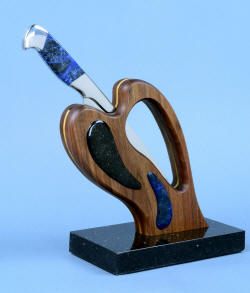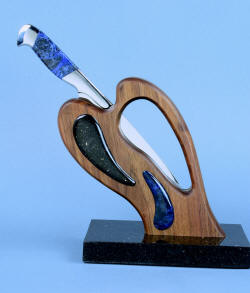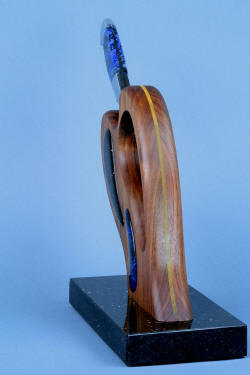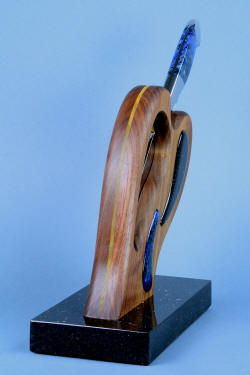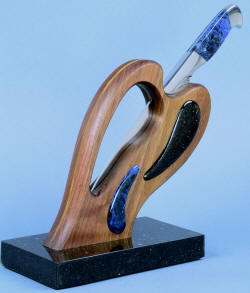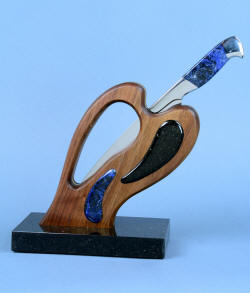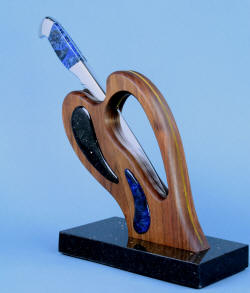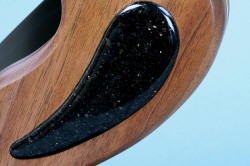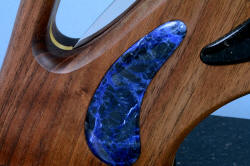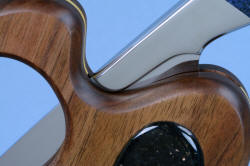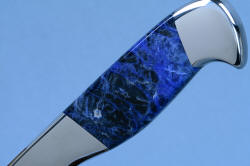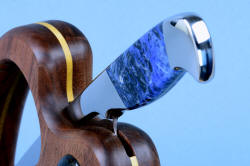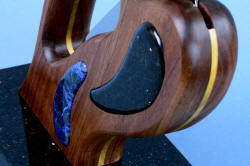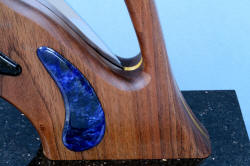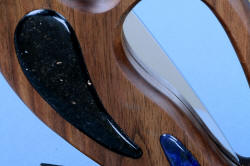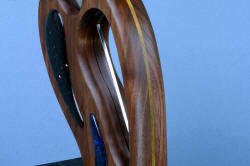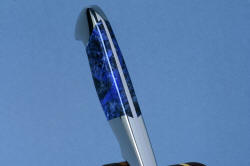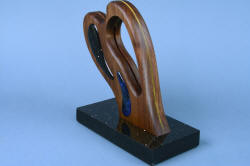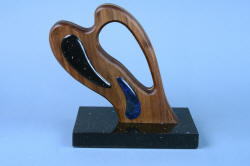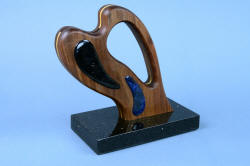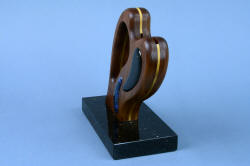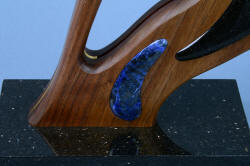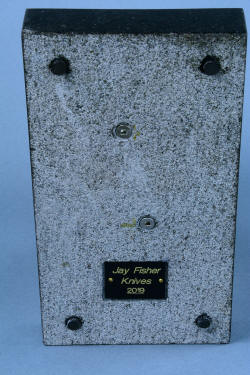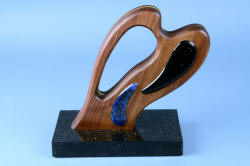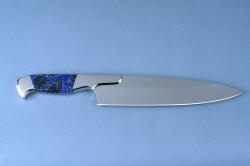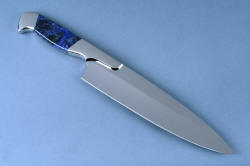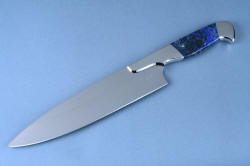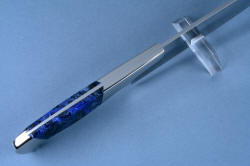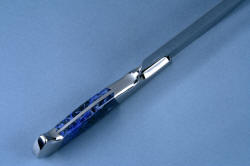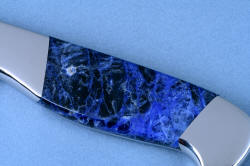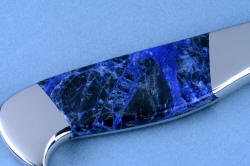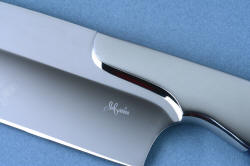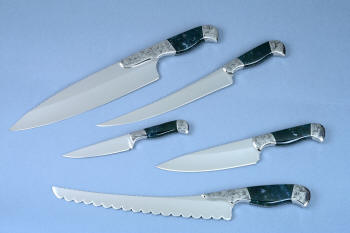"Concordia" Chef's Knife
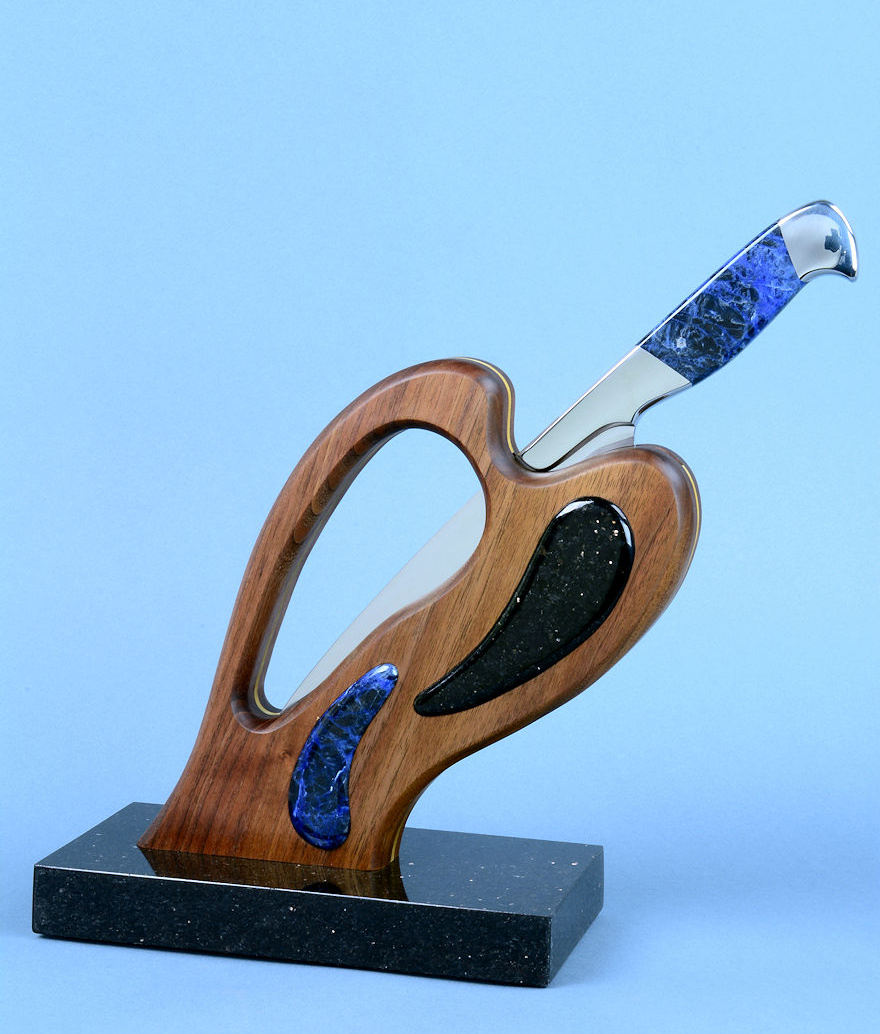
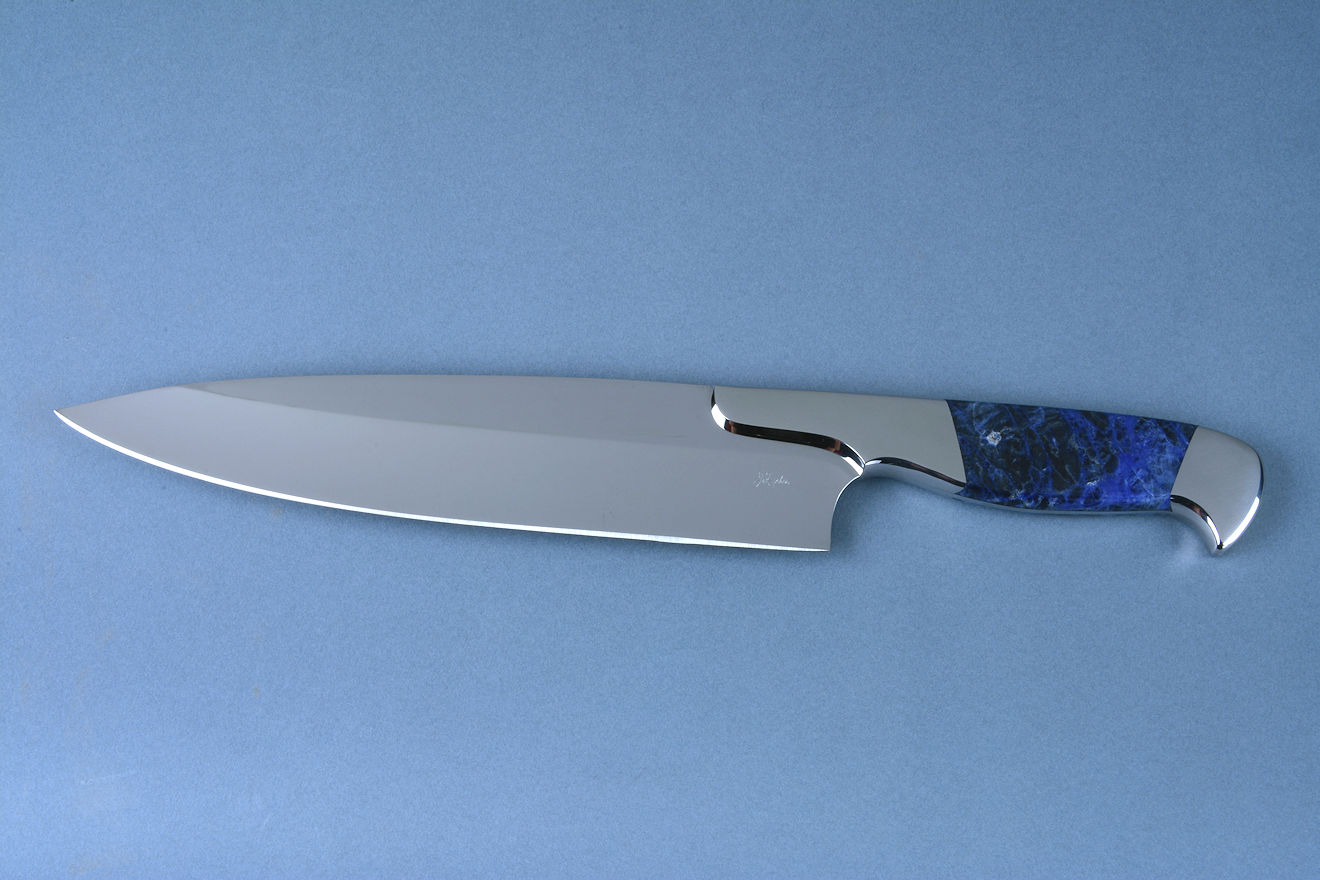
"Concordia" Fine Custom Chef's Knife
- Size (Knife): Length overall: 14.0" (35.6 cm), Blade Length (at cutting edge): 9.0" (22.9 cm), Thickness: .141" (3.6 mm)
- Size (Stand with knife): 12.75" (32.4 cm) tall, 4.75" (12.1 cm) wide,
13" (33.0 cm) long
- Weight: Knife: 15 oz. (425 grams) Stand: 7 lb. (3.2
kilograms)
- Blade: 440C high chromium martensitic stainless
tool steel, proprietary T3 deep cryogenic treatment, hardened and tempered to Rockwell C58, mirror polished
- Fittings/Bolsters: 304 austenitic stainless steel, mirror polished
- Handle: Polished Sodalite Gemstone (Brazil)
- Stand: American Black Walnut, American Poplar,
inlays of Sodalite gemstone, Black Galaxy Granite (India), base of
Black Galaxy Granite, neoprene feet, engraved black lacquered brass,
stainless steel fasteners
- Knife: This is a custom Concordia, one of
my most popular chef's knives, custom made for a great client. The
knife is a classic design, technically a "Sabatier" style,
originating in France and well-recognized all over the world. The
Concordia is large, and I've made this one with the finest treatment
and presentation possible for a singular knife and a beautiful, bold
stand.
- Blade: The Concordia's blade is 440C high chromium
martensitic stainless steel,
my most requested steel for many reasons. It's highly
corrosion-resistant, extremely tough, and has very high wear
resistance, while capable of an extremely thin, sharp, and
long-lived cutting edge. This is not only due to the steel alloy
content, it's because of my specialized proprietary heat
treatment. This steel is treated with my T3 deep cryogenic process, one that is
extremely lengthy and complicated and takes a full week, with
33 specific steps and temperatures ranging from over 1800°F
to -320°F! This process is so dynamic and transformative
that it creates extremely fine grain, low asperity, maximum
development of martensite, and a tremendous amount and
distribution of complex carbides. The performance of this blade
is exemplary, a blade that will literally last for generations
with minimal sharpening, high toughness, and high overall
strength. I will flatly claim that the condition of this blade
is superior to all others made; no one has or employs this level
of treatment detail in any knife, anywhere! In this Concordia, because my client
requested a very stiff overall blade geometry, I've created a thick,
wide spine and an extremely thin cutting edge. This is
accomplished with a 12" hollow grind (accomplished with a 12"
diameter profile). The blade is smooth and clean, with a fully
tapered tang for balance. The curvature of the blade is just
right for mincing, chopping and board work, and qualifies as a
master chef's main blade design. The heel is deep, dropping an inch
below the forefinger groove, and 1.9" below the spine. The blade
is hygienic and smooth and beautifully mirror-polished for easy
cleaning and high food safety.
- Fittings: I bolstered the Concordia with
zero-care high nickel, high chromium austenitic stainless steel.
This is the same steel used in stainless nuts, bolts, and
fasteners, and with 18 percent chromium and 8 percent nickel,
it's incredibly tough. This is a zero-care stainless steel, it
will not corrode, no matter what it could encounter in any
kitchen. The bolsters are rounded, contoured, and polished for a
comfortable grip, and the front bolster is elongated along the
spine of the knife. This is done for several reasons. One is to
give a wide, flat area for the thumb to rest in heavy cutting
chores, rather than bearing down on a narrow spine. The other
reason is to allow a "pinch" type grip along the spine for finer
dicing and board-work. The bolsters are dovetailed to anchor,
support, and bed the knife scales permanently to the handle.
- Handle: The handle scales chosen for
this project were at the request of my client, who wanted a
bold, blue color. Choosing Brazilian Sodalite also added
some fascinating pattern and light play in the striking
gemstone handle. Sodalite is a feldspathoid, often used in
jewelry, and this particular gemstone has a black matrix for
a bold, rich contrast. The scales are bedded to the tang
with a stress-free mounting, locked under the bolster
dovetails, rounded and smoothly polished. The fit is
flawless.
- The knife feels sizeable and
capable in the hand,
with the balance point exactly at the heel of the blade. When
gripped with an overhand spine pinch, this large knife feels light
and maneuverable, smooth and fresh, ready for any chef's task. A
simple rinse is all it usually takes to clean the bright, polished surface
in most functions, and the knife satisfies
food safety
requirements. While the spine is thick and strong, the
wide and deep hollow grind lightens the weight considerably.
The point is extremely thin and aggressive, yet tough and
well-supported by the blade geometry. This is a master
chef's knife made for accurate cutting, slicing, mincing,
and dicing, for generations. A true family heirloom.
- Stand: As with all of my knives, a commensurate
and beautiful stand was necessary. This is a stand designed not only
to grace the kitchen environment, it's an extremely stable base for
the knife that will safely store and display the knife for
generations. I made the body of the stand in American Black Walnut,
our nation's most valuable domestic hardwood for a reason. Walnut is
smooth, uniform, and durable, while being naturally beautiful. The knife blade edge rests on a thin slice of Poplar, a
soft and lighter-colored hardwood just right to bed the edge of the
knife and give a contrasting line in the form. I designed and created
the
sculptural form I named "splash" for the
stand, which works well with the deep, watery-blue of the
Sodalite gemstone knife handle. The design has water-splash shapes,
also recognized as paisley-figures, a very ancient form that is
attributed to dolphins, water, and fish. This form is represented in
the open carving and four inlays in the walnut. The inlays are
precise, deep, substantial, and clean, in polished Sodalite gemstone from Brazil, which display the rich royal blue
color. The black plagioclase feldspars in the Sodalite exhibit a
fantastic light play of iridescence called labradoresence. The other
inlays are of polished Black Galaxy Granite from India, the same
material as used in the base.
The inlays are bold, curved and domed forms that stand above the
surface of the walnut to give a distinctive view from any angle,
while being inviting to the touch. This compliment of materials and
placement brings together the blue and black in the handle,
the inlay gemstone, and
the massive black granite base. Because one of the main components
of this form is the cutout shape, it displays a bit of the knife
blade, while offering a handle to move the weighty stand around in
the kitchen environment. For safety, when the knife is in the stand, no part of
the cutting edge is accessible to the fingers. I wanted to make this piece as stable as
possible, so I cut and finished a thick, heavy slab of the black
granite (over 1" thick). This ornamental and functional stone is dense, hard, and
solid, with bronze-gold colored flecks of Enstatine (Bronzite)
throughout. The granite is mined from Chimmakurthi in Ongole district in the State of Andhra Pradesh in India,
and is so durable that it's used for countertops and architectural
components.
The walnut stand is secured to the granite base with stainless steel
screws, and the base has inlaid feet of neoprene to protect any
surface the stand rests on. The neoprene also aids in creating a
non-slip grip. Into the bottom (see photo below), I've inlaid a
legend plate in engraved black lacquered brass for provenance. I'm
very proud of this stand; I've saved the design for use in future
projects. The wood is oil-sealed and a periodic waxing of wood and
stone is all that will be needed to maintain the piece. In the
photos below, you can see that the stand itself is an independent
work of sculpture, and one of the features I'm known for. After all,
a plain knife block is so... pedestrian! This stand begs for the
chef to grip the bold handle.
- This is a wonderful project, and I'm thankful to my client and
patron for his patience, support, and input. The piece will last for
generations of use and eternal beauty. I've taken a ridiculous
amount of photos below; please look them over to appreciate this
work the way I have enjoyed making it!
Thanks A. K.!
Jay,
That is so unbelievably beautiful, I am at a loss for words. The downside of museum quality
is that it belongs in a museum for everyone to see and I will no doubt feel a little guilty using
this to chop produce. But I will not deny this work of art its purpose, so I shall definitely
put it to work.
—Later—
Jay,
Looks like a dream, cuts like one too. Has transformed the tedium of a marathon of holiday cooking to a joy!
--A.
Please click on thumbnail photos
